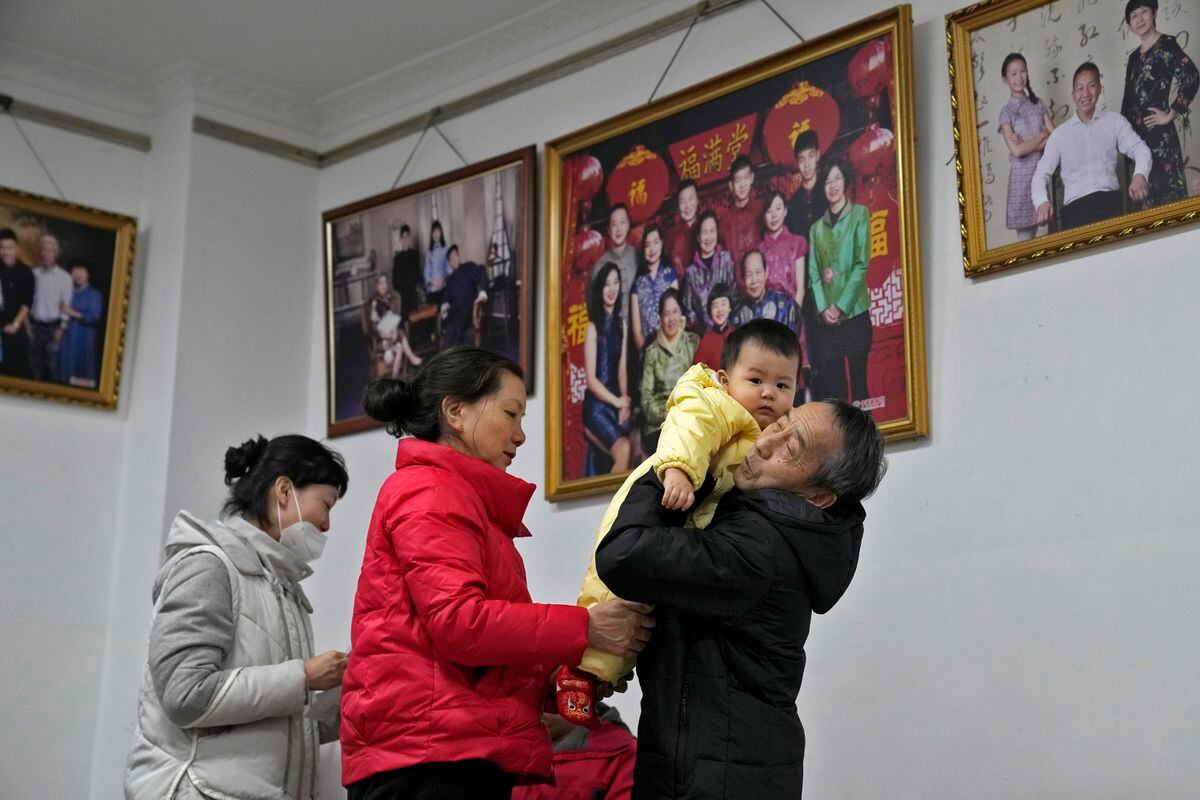China announced on Tuesday its first population decline in the last six decades, the consequence of a historic collapse in the birth rate and the accelerated aging of society.
According to figures released by the National Statistics Office (ONE), the number of the country's inhabitants fell by some 850,000 people in 2022, reinforcing predictions that this year China will cede first place as the most populous nation on the planet to India.
Demographic experts predict that these data could have profound implications for the Asian giant's economic growth, which is also slowing down.
“The Chinese population is declining nine to ten years ahead of official forecast.
We are facing a historic turning point," says Yi Fuxian, a scientist at the University of Wisconsin-Madison and an expert in Chinese demography, quoted by the
Asia Nikkei
media .
“The number of new births was below 10 million in 2022, that is, below that of India, and that indicates a significant change in the geopolitical and economic structure of the world,” he adds.
"Because China's demographic crisis is beyond imagination, the country's political economy, defense and diplomacy will undergo a significant transformation," Yi said.
The ONE reported this Tuesday that China closed 2022 with 1,411.75 million inhabitants, which contrasts with the 1,412.6 million that existed at the end of 2021. According to data from the World Bank, this is the worst population drop since 1961, the year in which it lost some seven million inhabitants in the framework of the Great Famine (1959-1961), caused by the failed industrialization campaign known as the Great Leap Forward.
The National Health Commission of China already anticipated last August that the country would experience a decrease before 2025 but, since last week, the official press had been warning of the possibility of this anticipated reduction, based on the estimates of demographic experts.
The fall is attributed to the drop in the number of births, which, as was known this morning, fell from 10.62 million in 2021 to 9.56 million, a drop of almost 10%.
The number of births per thousand inhabitants fell from 7.52 to 6.77, a record low since the founding of the People's Republic of China in 1949, according to the Hong Kong newspaper
South China Morning Post
.
More information
The Chinese economy grows 3% in 2022, one of the worst data in almost half a century
The official figures also reflect an increase in deaths, which went from 10.14 million to 10.41 million, the highest figure since 1976. The natural growth rate of the population was negative, standing at 0.6 per thousand people.
This population data includes people from the 31 provinces, autonomous regions and municipalities on the Chinese mainland, but excludes those from Hong Kong, Macao, Taiwan and foreign residents.
Faced with the demographic crisis in China, the United Nations has changed its forecasts and predicts that the population of the Asian giant will contract three times more than expected by 2050, the year in which it will drop to 1,313 million.
By 2100, the number of inhabitants of the country will be below 800 million.
Older people sunbathe on the street in Shanghai, China.
ALEX PLAVEVSKI (EFE)
The nationalist newspaper
Global Times
reports that the survey on which the ONE figures are based was carried out on November 1, so the number of deaths would not reflect a possible increase in mortality derived from the end of the restrictions imposed for three years. years to contain the pandemic.
The Asian giant shelved its strict covid zero policy on December 7 and since then the country has been suffering a tsunami of infections and an exponential increase in the number of deaths.
China acknowledged on Saturday that it recorded nearly 60,000 covid-related hospital deaths between Dec. 8 and Jan. 12.
Analysts believe that this historic population decline will mark the start of a long period of decline in the number of people in China, which could have profound implications for its economic growth due to a possible decrease in income and an increase in public debt. in view of the increase in health and social costs.
This Tuesday it has been confirmed once again that the country is embarking on an aging trend, since the percentage of people of working age fell from 62.5% of the total population to 62%, while that of older people 60 years of age went from 18.9% to 19.8%.
“China's demographic and economic prospects are much bleaker than expected.
China will have to readjust its social, economic, defense and foreign policy," considers demographer Yi Fuxian, quoted by Reuters.
In his opinion, the decline in the country's workforce and the drop in the weight of the manufacturing industry will further aggravate high prices and high inflation in the United States and Europe.
Much of the demographic decline is due to the one-child policy, in force between 1979 and 2015, but also to the skyrocketing costs of education, which have discouraged many Chinese from expanding families.
Despite the fact that since 2021 the Government allows having up to three children, and has not stopped announcing incentives to encourage couples to have children, the country's fertility rate (the average number of children that would be born per woman) is 1, 3, well below the 2.1 that is needed for the population to remain stable.
The Chinese authorities are aware of this crisis and, during the annual meeting that sets the national agenda for China's economy and finances, held in December, the leaders assured that the country will optimize birth support policies and try to gradually delay the legal retirement age.
The proposal is to extend it to 65 years for men and 60 for women, compared to the current 60 and 55 years.
"China cannot continue basing its structural engine of economic growth on its demography," says Zhang Zhiwei, chief economist at Pinpoint Asset Management, quoted by the
South China Morning Post
.
“The winds are blowing against it.
Economic growth will have to depend on increased productivity, driven by government policies”, concludes this expert.
Pedestrians on a crowded street in the Chinese city of Eatons on a crowded street lined with small shops in the city of Changsha.HECTOR RETAMAL (AFP)












/cloudfront-eu-central-1.images.arcpublishing.com/prisa/S7ERVSCT4FUVX6R7TUVBDNTH5Y.jpg)


